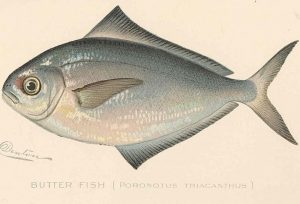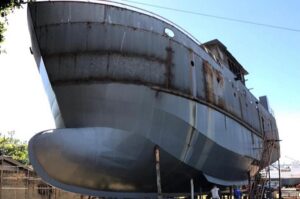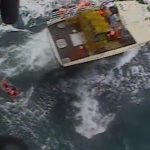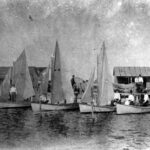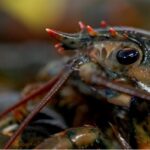Tag Archives: debris piled 30 metres high
Very few sockeye have passed Chilcotin River landslide area: DFO
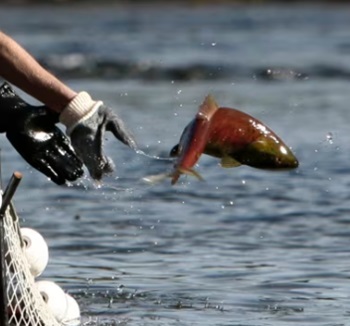 While sockeye salmon have been able to migrate past obstructions from the Chilcotin River landslide, the run is projected to be far lower than average. At the end of July, a landslide across the Chilcotin River at Farwell Canyon, about 285 kilometres north of Vancouver, blocked the flow of water. More than a week later, built-up debris and a pulse of water surged over the slide and down the Chilcotin and Fraser rivers. Now, a fraction of the average sockeye run has been observed past the slide area. A report from the Pacific Salmon Commission says higher-than-average temperatures and obstructions from the slide are hindering salmon migration up the Fraser and Chilcotin rivers. more, >>CLICK TO READ<< 15:11
While sockeye salmon have been able to migrate past obstructions from the Chilcotin River landslide, the run is projected to be far lower than average. At the end of July, a landslide across the Chilcotin River at Farwell Canyon, about 285 kilometres north of Vancouver, blocked the flow of water. More than a week later, built-up debris and a pulse of water surged over the slide and down the Chilcotin and Fraser rivers. Now, a fraction of the average sockeye run has been observed past the slide area. A report from the Pacific Salmon Commission says higher-than-average temperatures and obstructions from the slide are hindering salmon migration up the Fraser and Chilcotin rivers. more, >>CLICK TO READ<< 15:11
Share this post
Report shows salmon numbers slowing from B.C. landslide
 A new report is providing some early insight on how last month’s landslide into the Chilcotin River affected the run of salmon that swims up the Chilcotin and Fraser rivers every year to reproduce. Monitoring efforts reveal the number of salmon that head upstream during August has slowed — but the exact scale of the disruption isn’t yet clear. “The landslide certainly had a role already in slowing the migration,” Scott Hinch, a salmon ecologist at the University of British Columbia. “The issue is whether it’s slowed it to the point that these fish are not going to be able to complete their migration up the Chilcotin.” more, >>CLICK TO READ<< 08:49
A new report is providing some early insight on how last month’s landslide into the Chilcotin River affected the run of salmon that swims up the Chilcotin and Fraser rivers every year to reproduce. Monitoring efforts reveal the number of salmon that head upstream during August has slowed — but the exact scale of the disruption isn’t yet clear. “The landslide certainly had a role already in slowing the migration,” Scott Hinch, a salmon ecologist at the University of British Columbia. “The issue is whether it’s slowed it to the point that these fish are not going to be able to complete their migration up the Chilcotin.” more, >>CLICK TO READ<< 08:49
Share this post
‘Majority’ of chinook run is already past Chilcotin River landslide area: Cullen
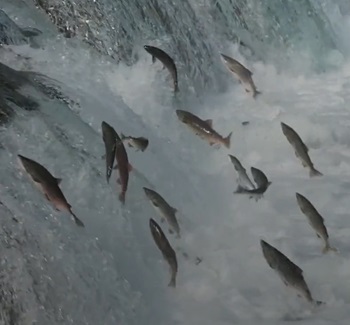 Water, Land and Resource Stewardship Minister Nathan Cullen says officials are estimating a four-to-seven-day window for returning sockeye salmon, but the “majority” of the chinook run is already past the Chilcotin landslide area. During an update on the landslide situation Saturday (Aug. 3), Cullen said the province is working very closely with First Nations and Fisheries and Oceans Canada to prepare. “While we know that there will be impacts on fish from there this event, our early assessment is that the majority of the chinook run is already past the landslide area,” he explained. Video, more, >>CLICK TO READ<< 10:44
Water, Land and Resource Stewardship Minister Nathan Cullen says officials are estimating a four-to-seven-day window for returning sockeye salmon, but the “majority” of the chinook run is already past the Chilcotin landslide area. During an update on the landslide situation Saturday (Aug. 3), Cullen said the province is working very closely with First Nations and Fisheries and Oceans Canada to prepare. “While we know that there will be impacts on fish from there this event, our early assessment is that the majority of the chinook run is already past the landslide area,” he explained. Video, more, >>CLICK TO READ<< 10:44
Share this post
Massive B.C. landslide could mean new barriers for struggling salmon
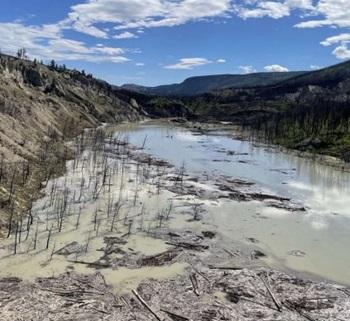 An expert on British Columbia’s salmon populations says the massive landslide that blocked off part of Canada’s largest sockeye salmon run has created an unprecedented situation potentially putting the already struggling fish at even more risk. Scott Hinch, the associate dean at the University of British Columbia’s Pacific Salmon Ecology and Conservation Laboratory, said the debris piled 30 metres high and 600 metres long blocking the Chilcotin River could cause problems for chinook and sockeye populations both while the water is being held back, and when it eventually bursts free. “These are natural events, but what’s unusual about this event is it’s occurring at a time when the rivers are way warmer than they used to be,” he said in an interview Thursday. more, >>CLICK TO READ<< 10:23
An expert on British Columbia’s salmon populations says the massive landslide that blocked off part of Canada’s largest sockeye salmon run has created an unprecedented situation potentially putting the already struggling fish at even more risk. Scott Hinch, the associate dean at the University of British Columbia’s Pacific Salmon Ecology and Conservation Laboratory, said the debris piled 30 metres high and 600 metres long blocking the Chilcotin River could cause problems for chinook and sockeye populations both while the water is being held back, and when it eventually bursts free. “These are natural events, but what’s unusual about this event is it’s occurring at a time when the rivers are way warmer than they used to be,” he said in an interview Thursday. more, >>CLICK TO READ<< 10:23


































